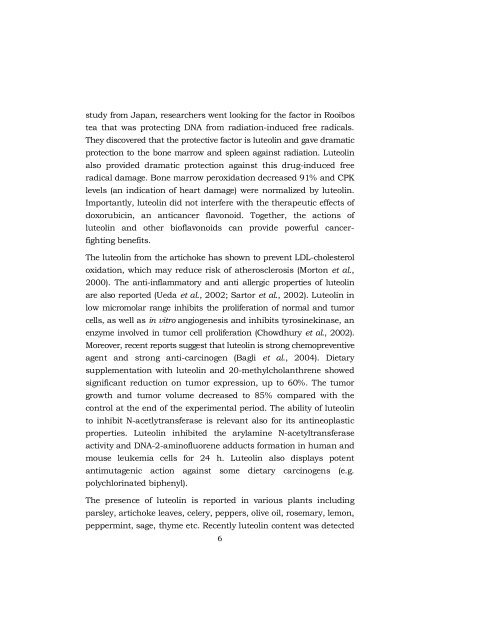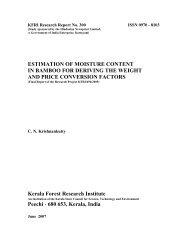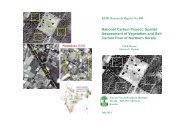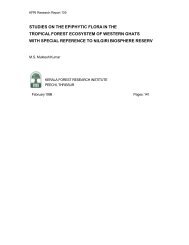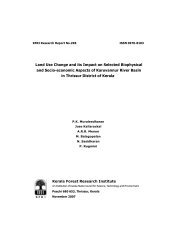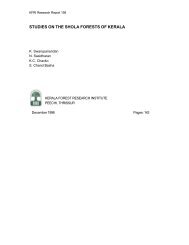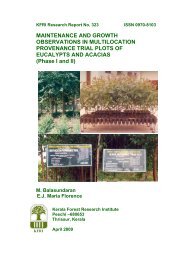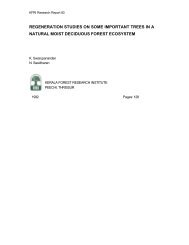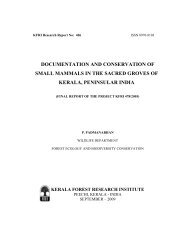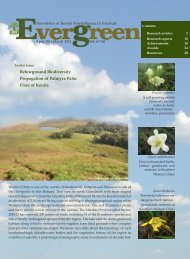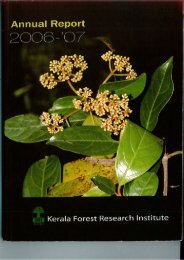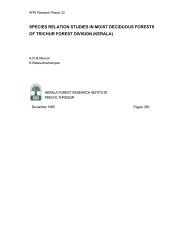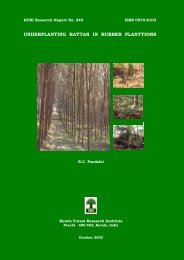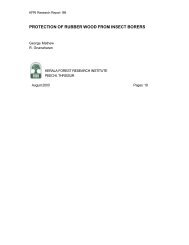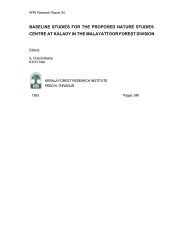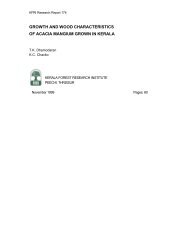Qualitative and quantitative analysis of biologically active principles ...
Qualitative and quantitative analysis of biologically active principles ...
Qualitative and quantitative analysis of biologically active principles ...
Create successful ePaper yourself
Turn your PDF publications into a flip-book with our unique Google optimized e-Paper software.
study from Japan, researchers went looking for the factor in Rooibos<br />
tea that was protecting DNA from radiationinduced free radicals.<br />
They discovered that the protective factor is luteolin <strong>and</strong> gave dramatic<br />
protection to the bone marrow <strong>and</strong> spleen against radiation. Luteolin<br />
also provided dramatic protection against this druginduced free<br />
radical damage. Bone marrow peroxidation decreased 91% <strong>and</strong> CPK<br />
levels (an indication <strong>of</strong> heart damage) were normalized by luteolin.<br />
Importantly, luteolin did not interfere with the therapeutic effects <strong>of</strong><br />
doxorubicin, an anticancer flavonoid. Together, the actions <strong>of</strong><br />
luteolin <strong>and</strong> other bi<strong>of</strong>lavonoids can provide powerful cancerfighting<br />
benefits.<br />
The luteolin from the artichoke has shown to prevent LDLcholesterol<br />
oxidation, which may reduce risk <strong>of</strong> atherosclerosis (Morton et al.,<br />
2000). The antiinflammatory <strong>and</strong> anti allergic properties <strong>of</strong> luteolin<br />
are also reported (Ueda et al., 2002; Sartor et al., 2002). Luteolin in<br />
low micromolar range inhibits the proliferation <strong>of</strong> normal <strong>and</strong> tumor<br />
cells, as well as in vitro angiogenesis <strong>and</strong> inhibits tyrosinekinase, an<br />
enzyme involved in tumor cell proliferation (Chowdhury et al., 2002).<br />
Moreover, recent reports suggest that luteolin is strong chemopreventive<br />
agent <strong>and</strong> strong anticarcinogen (Bagli et al., 2004). Dietary<br />
supplementation with luteolin <strong>and</strong> 20methylcholanthrene showed<br />
significant reduction on tumor expression, up to 60%. The tumor<br />
growth <strong>and</strong> tumor volume decreased to 85% compared with the<br />
control at the end <strong>of</strong> the experimental period. The ability <strong>of</strong> luteolin<br />
to inhibit Nacetlytransferase is relevant also for its antineoplastic<br />
properties. Luteolin inhibited the arylamine Nacetyltransferase<br />
activity <strong>and</strong> DNA2amin<strong>of</strong>luorene adducts formation in human <strong>and</strong><br />
mouse leukemia cells for 24 h. Luteolin also displays potent<br />
antimutagenic action against some dietary carcinogens (e.g.<br />
polychlorinated biphenyl).<br />
The presence <strong>of</strong> luteolin is reported in various plants including<br />
parsley, artichoke leaves, celery, peppers, olive oil, rosemary, lemon,<br />
peppermint, sage, thyme etc. Recently luteolin content was detected<br />
6


